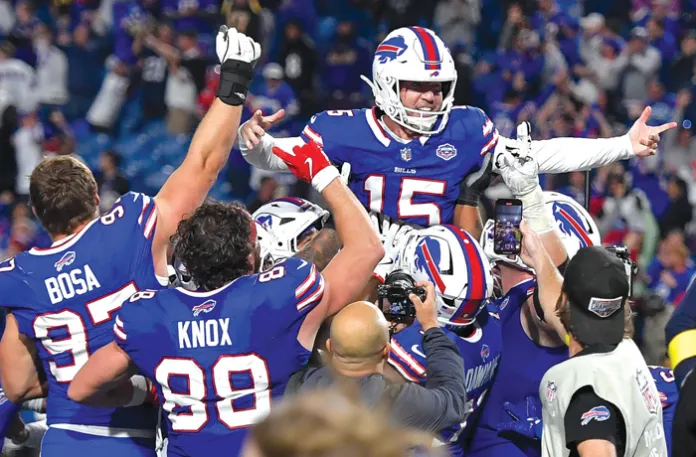On the NFL season’s opening Sunday, I sat down with millions of other Americans to watch the Buffalo Bills host the Baltimore Ravens. The matchup was superb on paper, featuring two teams with realistic Super Bowl hopes and lingering bad blood from last year’s playoffs. Nor did the action itself disappoint: Down 15 with four minutes to play, Buffalo engineered a comeback that turned the game into “an instant NFL classic,” to quote the Wall Street Journal’s next-day coverage. For those who stuck with the contest until its end, the heroics on display were almost literally unbelievable.
Alas, I wasn’t one of the faithful. I very rarely am.
Sports cynicism is a chronic rather than a fatal condition. Despite having missed more late-game reversals than I care to count, I continue to queue up with the rest of the fan base for my weekly fix. Mine are the rare rooting interests that have grown more, not less, rabid with age. The problem is that, an inveterate watcher of first-through-third quarters, I possess the world’s worst antenna for the looming rebound or rally. “It’s over,” I said to my children when the Ravens went up 40-25. Eleven-and-a-half minutes later, the Bills were high-fiving in the locker room. Though the Bills mean nothing to me, I hate the Ravens with a passion and sorely regret not seeing their collapse in real time.
A few stories will illustrate the point. When, in 2017, my beloved San Antonio Spurs came back furiously to force a playoff overtime, I had already moved on to a Law & Order rerun. (“Why aren’t you watching this?” my wife called from the other room, having flipped to the still-unfolding game.) A 1998 miracle featuring my Tennessee Volunteers and an infamous Arkansas fumble would have passed me by entirely had I, then a callow college freshman, been in charge of the remote. Infinitely worse would have been missing my Kansas City Chiefs’ first Super Bowl victory since 1970. That win, five years ago, required three fourth-quarter touchdowns and barely dodged being switched off early in the Hillard house.

Like any good American, I am inclined to blame my parents. My mother, who has never cared a whit about sports, provided no example of in-game loyalty or the moral necessity of going down with the ship. If such a thing is possible, my father, given to such utterances as “It’s not looking good” every time an opponent scores, is even more pessimistic than I am. Discussing this article with my brother, I learned of his own struggles with untimely exits. When, eight seasons ago, UCLA stormed back from 34 down to beat Texas A&M at home, he was among the 64,000 in attendance — at least for the three quarters that turned out not to matter.
It isn’t just us, of course. Buffalo’s week-one comeback was seen by far fewer Bills fans than witnessed the team’s early blunders. (Quarterback Josh Allen: “Have some faith next time.”) The podcaster Bill Simmons has confessed to watching one of his Red Sox’s most iconic plays ever — Dave Roberts’s base steal to keep the team alive in the 2004 ALCS — from underneath the Fenway grandstand rather than from his seat. Hilariously, a Buffalo-based marketing agency has set up a website where fans can apologize to the team for abandoning the struggle. “Dear Josh,” one distraught missive reads, “I didn’t leave early but I turned it off. I regret it. Please understand that it wasn’t personal.”
Sports cynicism has deep psychological roots. To begin with, and as any fan knows, sports losses hurt worse than sports wins feel good. The Chiefs’ three Super Bowl trophies in my lifetime have done nothing to ease the pain of the team’s 2004 “no-punt” playoff loss to the Indianapolis Colts, or, going back farther still, the Lin Elliott game. (Look it up. Actually, don’t.) The Spurs’ 2013 NBA Finals heartbreaker was kind of eased by their 2014 championship, but I still think about Ray Allen’s corner three at least once a month. Like a hermit retreating into the woods, I turn the game off early because I can’t hack it here in civilization. Rooting for a team means taking the bitter with the sweet. Yet that’s one social contract I can’t sign.
HOGAN’S HEROES: A WRESTLING ICON AND THE POLITICAL DIVIDE
A writer more sophisticated than I am might hear echoes from the old country in these lamentations. Poverty’s residua can afflict even the well-to-do man. Among my most deeply encoded genetic traits is the fear of being ripped off. Among my most closely held beliefs is that you’re trying to screw me right now. If an athletic contest is going to keep me up past my bedtime, then I had damn well better get a win out of the deal. To stay up late for a loss is to get hosed. Only a sucker would fall for it.
And so we come to another football season, full of swings and about-faces that I will frequently fail to see. As I write these words, my Vols are about to take on the Georgia Bulldogs in a matchup I’ve been looking forward to all summer. If they fall behind by more than a touchdown, I’ll probably read a book instead.
Graham Hillard is editor at the James G. Martin Center for Academic Renewal and a Washington Examiner magazine contributing writer.














